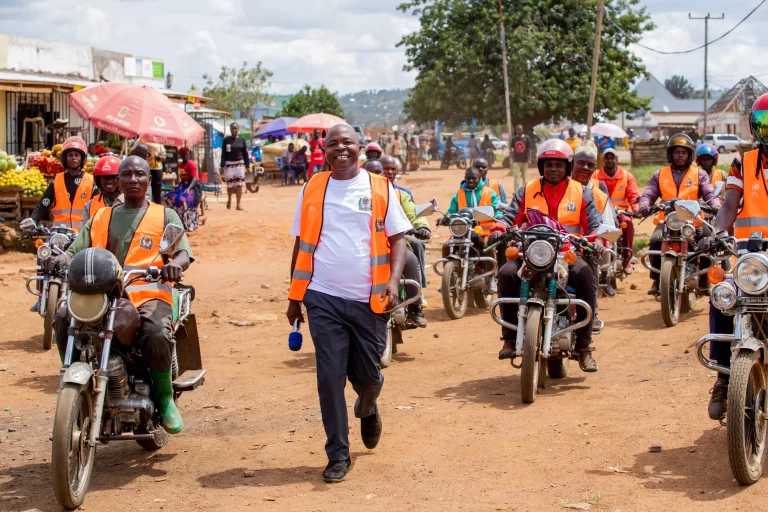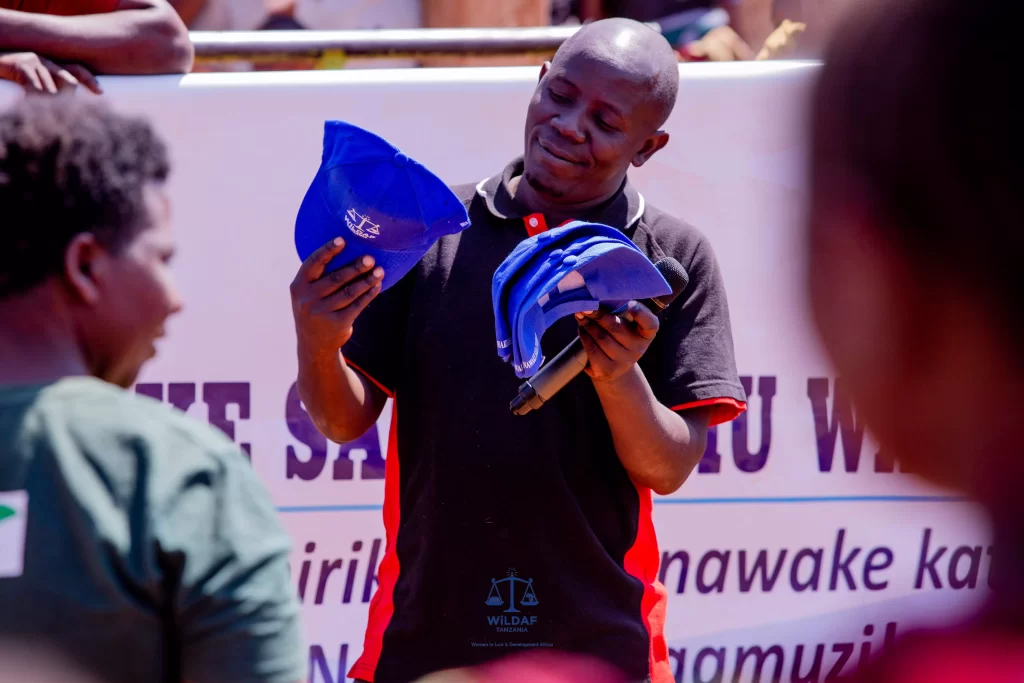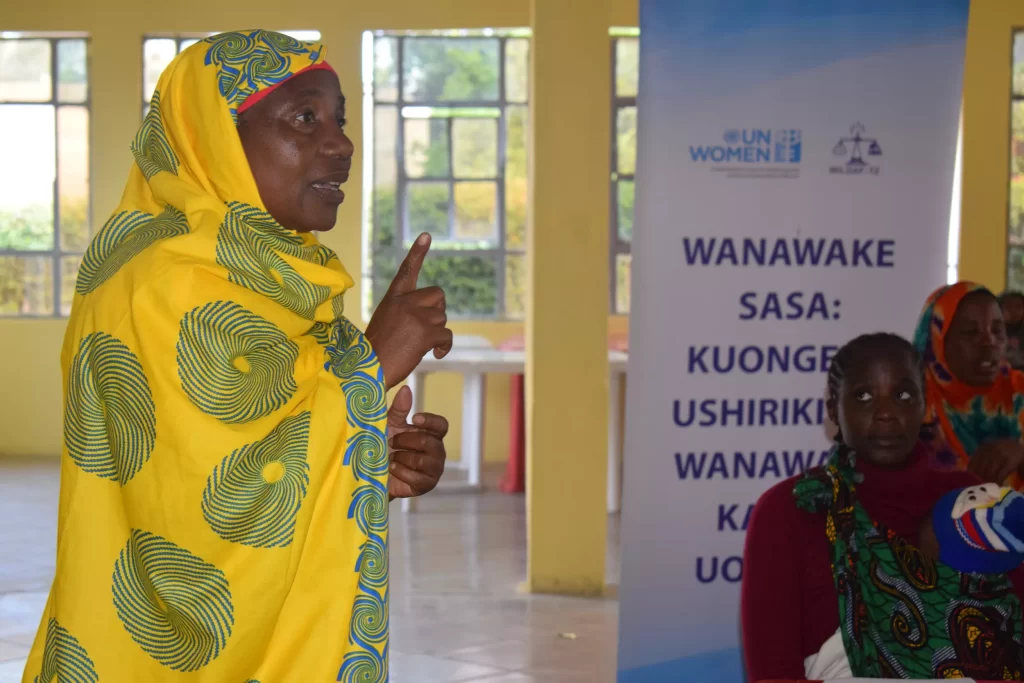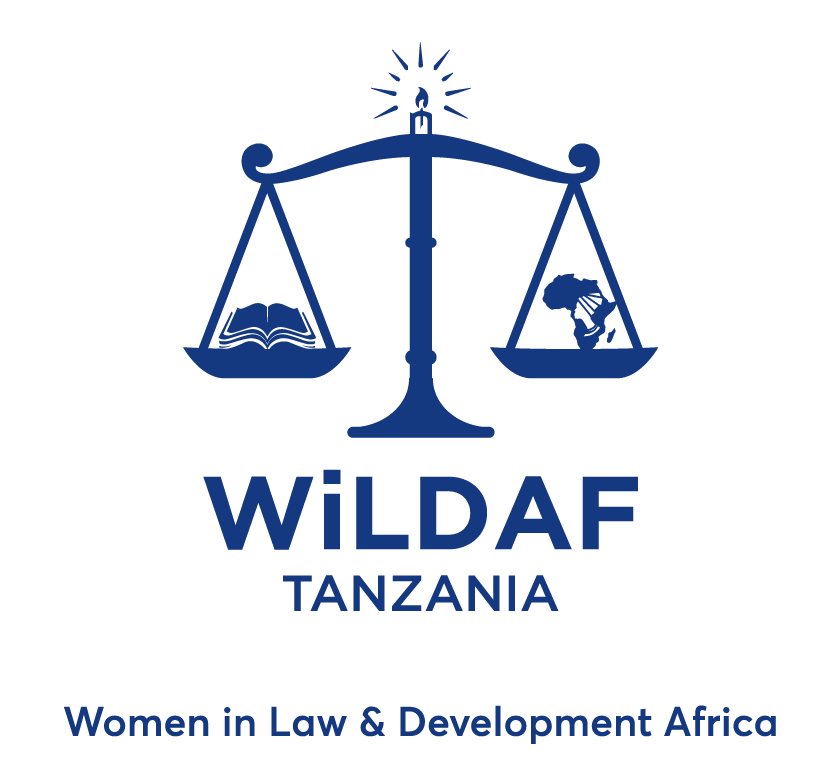Our Impact in Stories
WiLDAF Advocacy Work for Legal and Policy Frameworks is Centred to Bring Impact in the Lives of Women, Girls and Society at Large.
- WiLDAF contribution in the Beijing Platform for Action movement
- WiLDAF Contribution in the development of Maputo Protocol
- Making Global and Regional Instruments a Reality to National Laws, Policies and Guidelines
- Enactment of the Legal Aid Act No.1 of 2017
- Political Parties Act (CAP 258) R.E 2019 and National Election Act (CAP 343) Revised 2015.
- WiLDAF: Championing the establishment of Temeke one stop judicial centre
- Review of HIV/AIDS (Prevention and Control) Act No. 28 of 2008
- Review of Discriminatory Laws of Inheritance
- Review of the Law of Marriage Act No. 5 of 1971
- Ratification of ILO Convention No. 190 of 2019
- Review of Police Form Number 3 (PF3)
- National Plan of Action to End Violence Against Women and Children (NPA-VAWC 2016/17-2021/22)
- Guidelines for the Establishment and Operationalization of Gender Desks in Higher and Middle Learning Institutions
- National Gender Policy
- WiLDAF Contribution in the development of Gender Bench Book on Women’s Rights
- Advancing Women’s Rights through Legal Aid Services Provision
- Development and operationalization of gender desks in higher and middle learning
institutions. - WiLDAF: Championing the Review of the Political Parties Act and the National Election Act.
Our Stories of Change

Creating He For She Champion
WiLDAF’s Rule of Law and Access to Justice Programs, backed by USAID, have done more than just change laws—they’ve transformed mindsets and forged champions.
Meet Mr. Selemani Bishagazi, a beacon of change in his community. Leading the charge at the Kipunguni Paralegal Centre, Selemani wages war against Female Genital Mutilation (FGM). But his 1ght doesn’t stop there. Recognizing the intersectionality of women’s rights and economics, he’s pioneering sustainable income opportunities for women who once depended on FGM for survival. Now, in the lush gardens of Kipunguni, former FGM practitioners cultivate and sell vegetables, providing for themselves and their families. Trained by WiLDAF as one of 24 paralegals, Selemani’s vision has birthed the Kipunguni Paralegal Center—a beacon of change where he believes the community holds the power to eradicate all forms of violence against women and children.
Nestled in the heart of Kipunguni Ward, Ilala District, Dar es Salaam Region, the centre stands tall in a community plagued by high rates of FGM and child marriage. It’s not just a sanctuary for victims; it’s a force for advocacy, tirelessly championing the end of FGM and gender-based violence (GBV). Their eIorts haven’t gone unnoticed. In 2020, the center, led by Mr. Bishagazi, was hailed as a GBV trailblazer during the annual anti-GBV Awards, held amidst the fervor of the 1G Days of Activism campaign. Their impact has drawn the attention of government o cials and Development Partners alike, with visits from the Minister for Community Development Gender and Children, Honourable Dorothy Gwajima, and UN Women Global Executive Director, Sima Bahous.
As a beacon of gender equality and women’s empowerment, Selemani’s community has honored him in a profound way—by naming the street where he resides ‘Mwanaharakati Street,’ loosely translated as ‘Activist Street.’ His journey is a testament to the power of one individual to ignite change and pave the way for a brighter, more equitable future.
Against All Odds
With the help of Irish Aid, WiLDAF has raised community awareness and facilitated a mindset shift away from condoning gender-based violence.
Imani* was raised in a setting where it was accepted that violence was usual. Her father would not give in to even the tiniest need and would frequently beat individuals in front of her and her mother. At the age of seven, she was raped one night. She endured this terrible ordeal alone and for a long time was afraid to notify her parents for fear of getting severely beaten up. She was lucky enough to be a part of the Mawio club when WiLDAF founded it at Jacaranda* Secondary School in the Dar es Salaam Region, where she was a student. In her own words, she says;
“From the first day I joined the Mawio Club, my entire mindset on GBV completely changed. Mawio Club served as a safe space for me because I was once a victim of GBV. In the time when I was a member of the club, I was able to develop dreams to be somewhere better in the future. It has been my pleasure to be a member of the Mawio Club because it has opened doors for me and allowed me to see the world in a different perspective” she said. “Now I am at the University of Dar es Salaam studying for a Bachelor of Arts in Sociology. My decision to take Sociology was inspired by being a member of Mawio Club because I want to help people as a champion of GBV prevention. I know that many Tanzanian girls have been victims and violated by people close to them and I am certain that by studying Sociology, I will be in a position to positively impact society through my knowledge and skills” Says Imani*, one of beneficiaries of WiLDAF’s Mawio Clubs (*Name has been changed to protect the identity of the student)”

Riding to Change
WiLDAF is spearheading a grassroots movement for social change, empowering communities to break barriers and elevate women’s leadership through the Wanawake Sasa Project, supported by UN Women.
Meet Mr. Zamoyoni George Mwololo, a father of four and a motorcycle rider from Kongwa District, Dodoma Region. Trained in women’s political participation, he gained insight into the entrenched gender norms and practices that hinder women’s equal involvement in leadership roles. From discriminatory access to resources like land and capital to deep-rooted cultural beliefs, Zamoyoni uncovered the systemic barriers that hold women back in Kongwa’s political arena.
But Zamoyoni didn’t stop there. Inspired to be a catalyst for change, he became a Wanawake Sasa Champion. He led by example, advocating for women’s rights within his bodaboda group’s constitution and rallying his peers to protect women and children both on and of the road. Teaming up with paralegals in Kongwa district, they provided vital support to women facing gender-based violence, empowering them to step into leadership roles with con1dence.
Today, Zamoyoni’s bodaboda group stands as a beacon of change in Kongwa District, earning the respect and trust of their community as a go-to resource for support and guidance. Their journey is a testament to the power of grassroots action in driving meaningful social transformation.
In the wake of their efforts, Zamoyoni declared,
“The group has brought transformational change in the community; GBV cases are now being reported and several women contested for office in the past 2020 general elections. This is a good sign that attitudes of men towards women leadership is shifting for the better in Kongwa.”
Overcoming Stereotypes
Rachel Ngassa, aged 34, stands as a beacon of change in Ushirombo, Bukombe District, Geita Region. As both a female pastor and a dedicated single mother, she embodies resilience and empowerment.
Rachel’s commitment to advancing gender equality is unwavering, as evidenced by her role as a champion for the Wanawake Sasa project, supported by UN Women. With passion and dedication, she tirelessly advocates for gender equality within her congregation and throughout her community, inspiring others to join her in the 1ght for a more inclusive and equitable society.
“Here I am today! I have been able to understand my rights as a result of the Wanawake Sasa Project, and now I have decided to be a women’s rights activist, particularly focusing on our Revelation
congregation church to influence more women to take up leadership roles. My life has changed, and 17 have started a special program in the church where we have leadership sessions with young women from Igulwa, Ubalozi, and Busanda localities. I encourage them to be pastors like me, despite the challenges they face in the community,” she declared.
Pastor Rachel received WiLDAF’s training on women’s rights and women participation in political leadership. She now uses her inRuence as a pastor to engage with political parties and government leaders for women participation in leadership. She is a strong mobilizer of women and girls, empowering them to know their rights. She is respected and a lot of women look up to her in her community.

Breaking Gender Barriers
In the heart of Kijota Ward, Singida Rural District, Farida Muro, aged 43, shines as a guiding light and a source of inspiration. As a devoted Muslim religious leader and a proud Wanawake Sasa Champion, she embodies resilience and determination.
Despite facing barriers erected by those citing ‘religious reasons’ to impede women’s progress in leadership and political participation, Farida remains undeterred. Thanks to the transformative training and enlightening awareness sessions conducted by WiLDAF through the ‘Wanawake Sasa’ project, supported by UN Women, Farida and numerous women in her community found the courage to step forward and contest political o ce in the 2020 general elections.
Armed with newfound knowledge and empowered by a supportive community, these women embraced their potential and overcame obstacles that once stood in their way. Farida’s journey serves as a testament to the power of education and collective action in breaking down barriers and paving the way for women’s leadership and empowerment. Her story is a story of strength and resilience. In her own words, she said
“In 2020, I decided to run for the Ward Councillors position in Mudida Ward, Singida Rural District. I was the only woman contestant among 10 contestants. Despite the fact that I didn’t win the election, I came in third. This is great progress to me and women in my community. I believe that I have set the momentum for women aspiring for political leadership in my community and hopefully in coming elections more women will contest.”
